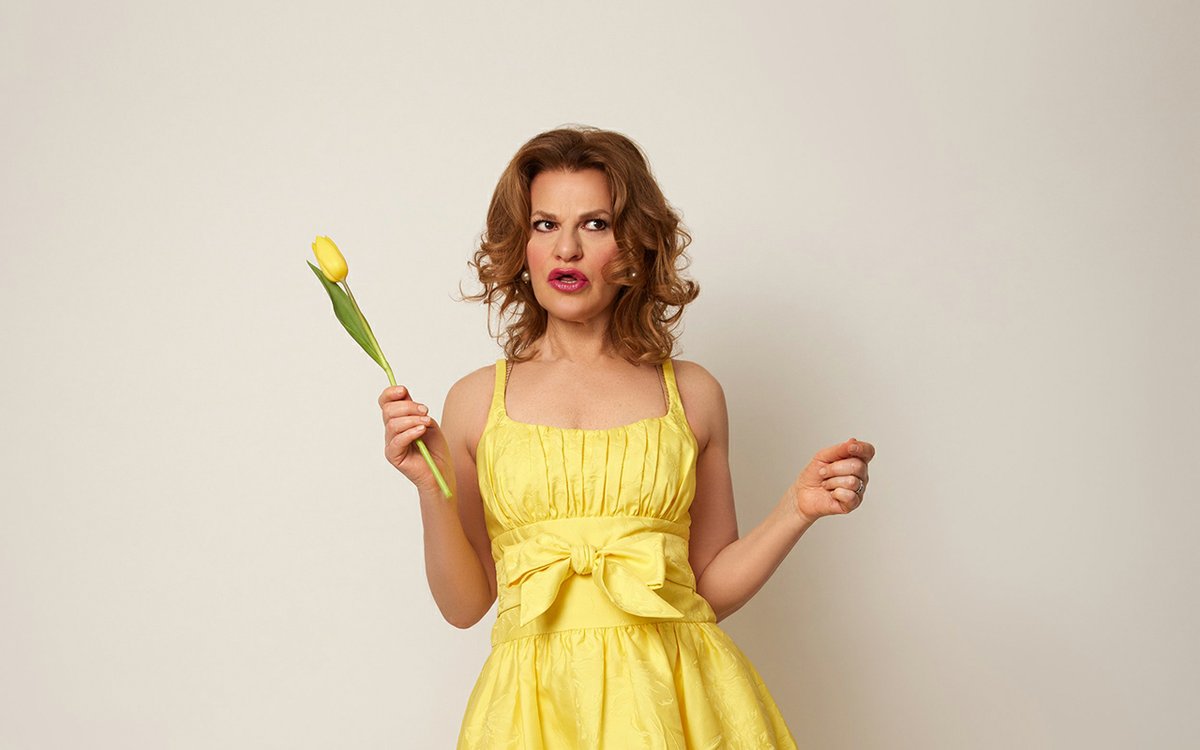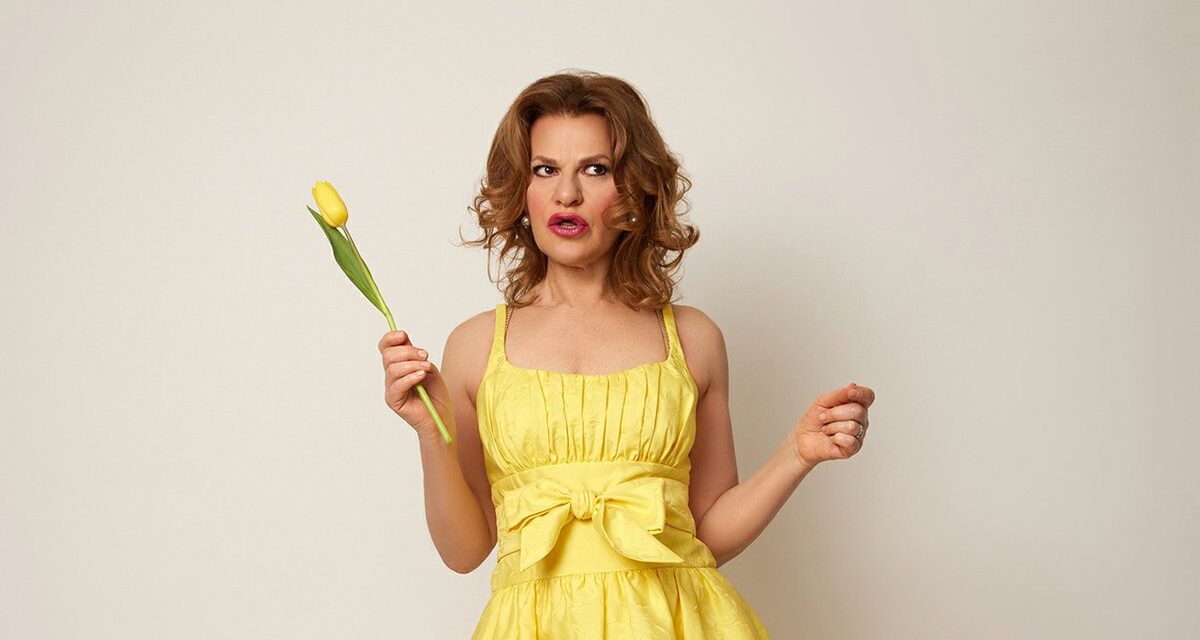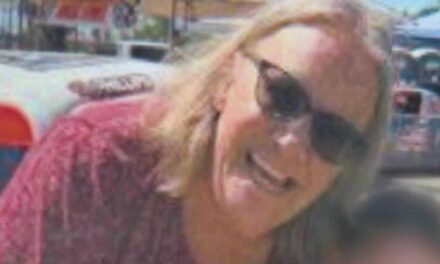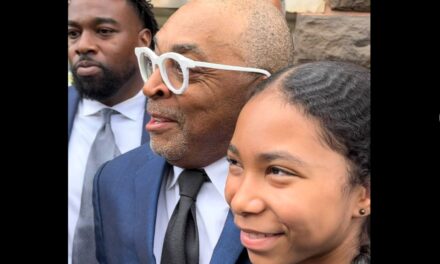
There’s never been a performer like Sandra Bernhard, and there never will be. Her trademark ferocity—her seeming ability to say whatever she wants whenever she wants to, her utterly unique look, her low-meets-high comic sensibility—she’s completely sui generis.
She emerged from Los Angeles’ stand up scene in the late 70s, working out of The Comedy Store before being noticed by the great Paul Mooney, who cast her on The Richard Pryor Show. In 1983, her second film role ever was in Martin Scorcese’s The King of Comedy, where she pretty much stole the movie out from under both Robert DeNiro and Jerry Lewis. She spent the 80s splitting time between the couch on Late Night with David Letterman and in Madonna’s Manhattan entourage. In 1990 her filmed version of her off-Broadway one woman show Without You I’m Nothing, finally won her the critical acclaim that she acted like she was in possession of from the moment we first saw her. And she spent the rest of the decade portraying one of the first bisexual characters on television in Roseanne. More recently, she’s been a muse for Ryan Murphy, first in Pose, and then on American Horror Story.
Ahead of the local debut of her new one woman show, Spring Affair, at the Parkway on Saturday night, we talked about the things she wouldn’t say now that she did at the beginning of her career, what the hell aging gracefully means, and why she hasn’t talked to Madonna in years.
I took this interview opportunity to revisit your 30 classic Letterman appearances—I’m like halfway through 1988. You’ve been making fun of the culture while enthusiastically engaging with it from the get. So is this new show going to be the latest iteration of that process?
Absolutely. Although I think things have evolved over the years. You have to edit yourself more than ever, because of not wanting to hurt or offend anyone. There’s a lot of territory that I don’t wade into anymore. I always felt that I did everything with a real critical eye, but people don’t know how to take different levels of irony with their social criticism anymore. I think my audiences do, but if something gets misinterpreted and written about, then you’re sort of spending your time trying to explain it. And I never want to explain my work.
Are you saying that you wouldn’t cover Nina Simone while wearing a turban and kente cloth, as you did to open the film of your 1990 one woman show, Without You I’m Nothing?
Very likely that I would not do that, correct.
But in 1990, your entire show was about cultural appropriation.
Exactly.
In a way that was light years ahead of its own time.
Excuse me, are you a person of color?
Nope, I’m a big white guy.
If you’re Black I might talk in a different way, but you’re not, so I won’t. But the bottom line is, yes, that’s exactly what that film’s about. And that’s the brilliance of it—it was so far ahead of its time. It was critiquing all of white culture, and how we all appropriate the coolness of Black culture. We try to be hip and groovy and we all fall flat.
There’s that long section later on in the film, where you’re portraying this woman from Arizona who collects Navaho art.
The whole thing, it’s piece upon piece upon piece about that. That was also the brilliance of my collaborator at the time: John Boskovitch, who was a conceptual artist and happened to be a very funny writer, and he helped craft a lot of that in that film. Yeah, that film holds up. And people who love it love it. And I think if you showed it now people would get it, but I can’t say that I could make that film now, because it would be boring. Because all anybody talks about is cultural appropriation. And I couldn’t do it in that kind of freeform groovy crazy way that I did back then, so it would be counter-productive. But thank god I did it then, and it’s a real testimony to where I’d been and where I am. And that’s all I can say about it. I’m very proud of that. My proudest thing is that movie.
I don’t have to be the latest person to tell you that it’s genius, but I am from Minnesota, and the grand finale of the film is your cover of “Little Red Corvette.” Obviously you can tell from the monologue, where you namecheck the women in Prince’s life at that time, that you not only admire him, but that you understand Prince’s entire mythology. But how did you get his permission to use the song?
I think whoever handled that part of getting legal rights, obviously they signed off on it. I can’t remember, because we also used his version of it.
Yes, for the strip tease, it’s set to his version.
Yes, it’s a no brainer, and I think he was familiar enough with my work that he trusted that he would be okay with it. I can’t say definitively how that works, but they got the rights and I’m sure they had to pay him.
Before Prince died, Madonna dropped by Paisley Park. They were friends, and you were tight with her for so long before your big falling out. Did you ever meet Prince?
I only met him once, at a fashion show in New York. We were sitting next to each other and we barely said a word to each other. He was staring ahead, and I was too nervous to say anything. I think we might have said hello. That was literally the only time I met him, and the only time we interacted in any way. But I mean, now I just think, I never really had a chance to talk to him. I dunno, sometimes that happens with certain people, you don’t get that chance.
Your pop culture consumption in the early ’80s was so omnivorous. You would bring so many props onto the Letterman show—fashion magazines, gossip magazines, etc. But you would also drop references to avant garde artists like Rainer Fassbinder and Laura Nyro. You maintain such a downtown ironic critical distance, but you clearly love Hollywood and pop culture.
There’s nothing I need to add to that. Just write what you just said.
Ha! But you must’ve lived in the record shops and the theaters back then. But when you’re leveling your caustic POV at American pop culture these days, where do you find shit? Are you on tiktok?
No. I’m not on TikTok. I’m on instragram, but I’m not interested in any of that kind of stuff. It’s so ephemeral. It has no value. It isn’t created for artistic reasons. It’s just somebody sitting in their house, emulating 10 million other people, doing these weird movements and saying these weird things that make no sense to me. I don’t know what I draw from, to be honest. I guess I draw from more quotidian things—just life. Going to the grocery store, walking down the street. I can’t really distill what I draw from.
You can’t explain your pop culture osmosis to me?
It’s sort of similar to the way it always was. It’s much more analog: I still read hardcover books, I read magazines, I read the New York Times when it gets dropped in front of my door. I walk to the grocery store, I do my own shopping. I go to the gym. I don’t really like doing things online if I don’t have to. I continue to be in the world, observing human frailties and oddities. My process hasn’t really changed. It’s stayed in that time, but it’s modernized because we’re living in a new century.
When’s the last artist you’ve been obsessed with, or at least caught your interest long enough to make you dig a little deeper?
There’s not really anybody in particular. I’ve liked some of Lana del Rey’s songs. Some of her music. I like Phoebe Bridgers. There’s nobody super contemporary that I’m swept away by. Like there’s nobody whose album I have if there is such thing as an album, stem to stern. I hear about people, you know like Japanese Breakfast. I just listen to the radio, especially when I’m in LA, more than New York. You can’t listen to the radio when you’re in your own home, because there’s too much going on. But when I’m in the car, that’s when I end up listening to most of my music. And I do most of my driving when I’m driving in LA. So I’ll listen to LA stations and I’ll hear new people and I’ll go oh I like that song.
Are you spending more time in New York or Los Angeles right now?
I’m based in New York so I’m definitely spending more time here. I ended up watching every episode of Daisy Jones and the 6. I watched the first one, and I thought ugh, I don’t like this. But we were out of town, and I started watching it and I kind of got swept up in it, and of course it was nostalgic because it was placed in the 70s. It was really sort of a spin off of Fleetwood Mac and Stevie Nicks, which I enjoyed. And I ended up really liking that. And the music was really good. It was written by great songwriters, and it was some of the best music I’ve heard in awhile because it was emulating that time. Everybody was really good in that. You believed them that they were musicians and were having that experience. I’m just using that as a template for something contemporary. It’s funny because it’s obviously not contemporary, but it’s a tribute to that time, which was my favorite time.
Does any contemporary stuff make it into the new live show, or are you still focused on interpreting standards and new standards?
Yeah, it’s pretty much covers of favorite tunes. Big band music.
You are one of the coolest people in the world, but you came out of Scottsdale, Arizona. You have that line about how your mom was an abstract artist and your dad was a proctologist. So do you still see yourself as an underdog in the culture? You’ve always carried yourself with such a fearlessness, but is that a reaction to your own self-doubt?
That’s the human condition. We’re all in a constant state of figuring it out. And I think that’s changed to a certain extent: I think I know myself more now than I did when I was 25. But every decade, there’s a new dilemma in your psyche and in your emotions that you have to contend with. But I feel like it’s been a pretty decent evolution for me. I feel pretty good about myself. I feel okay about aging gracefully—whatever the hell that means. But I still like the things I like. I mean, I like glamour. I like beautiful things, I like great food. I like hanging out with friends. I love to travel. And I like excitement. And that’s something that’s inspired me from the beginning of my adult life.
You came out of the gate outshining DeNiro and Jerry Lewis in Scorcese’s King of Comedy. But watching these old Letterman shows, you were playing Niagara Falls and Long Island, these tiny little upstate clubs, even though you were instantly famous. Was there ever a point where you felt like you’ve made it? Or is it just the nature of showbusiness that you’re never secure?
That’s part of the fun of it. When you come from the live performing world, you’re always going to do that. And you’re going to end up in places that are kind of funny and funky and that’s part of the fun of it.
Like Minneapolis!
Minneapolis is a great city. Lots of stuff has come out of Minneapolis. It’s great to come back to cities and sort of weave together all the years you’ve been there. And it gives you a chance to look back at what you’ve done and who you were and who you are now, when you come back to markets that you’ve been coming to since you were 20, 22, 25 years old. It’s a cool kind of continuum.
You’ve been such a success on the Ryan Murphy productions, Pose and American Horror Story, but is live performance who you really are? Do you still live and die on the stage?
I think anybody who’s born to perform live, they are always going to do it. My friend Chrissie Hynde, the pandemic drove her insane. As it drove all of us insane. And now she’s back on the road and every time I try to reach out to her, she’s like, “can’t talk, I’m opening for Guns N Roses!” She’s insane now.
She’s playing 7th Street Entry, the small 150 cap room connected to First Avenue.
That’s probably for her new album.
Yeah, she wants to be close to us.
She doesn’t care. As long as there’s a stage and an audience, she’s going to do it. And I feel the same way. And that’s why she’s such a good friend, because she gets it. She’s from the Midwest. And I was born in Michigan. And there’s just a sensibility—get on with it. Roll up your sleeves, get out, do your thing, nobody is going to cater to you.
At the same time, you’ve experienced some of the most rarefied pop culture air as a fashion icon. Is one of the reasons that the fashion world—people like Andre Leon Talley and Isaac Mizrahi—took a shine to you because you were so fearless and confident? Did you dress in whatever you felt looked cool and then they started dressing you?
I think they loved my personality, my persona. I talked about fashion in my work from the first time I got on stage. Fashion always captivated me. I critiqued it and at the same time I celebrated it. So I think people got a real kick out of that. No comedian talked about fashion before. And I was tall and skinny, so it was like the perfect storm to be dressed by all these designers and to be a part of it.
When people close to you, mentors like Andre Leon Talley and Paul Mooney, pass away—and I’m sorry for your loss—does that make you ruminate on your own mortality?
Thank you. I mean in both cases, and I won’t go into it, because I don’t want to reveal personal things about my friends even though they’re not here anymore, but neither one of them were well. So yeah, it’s terribly sad and I miss them both. It’s a huge hole in my life. But I feel great. I’ve also simultaneously been seemingly carefree, but I’ve taken excellent care of myself. I think health is something given to you and you have to cultivate it and protect it. So yeah, it’s a mixed bag you know, when people get older and some of them haven’t taken care of themselves over the years. I wish I could wave a magic wand and make things better for people. But you can’t always do that, you can only do it for yourself.
Realizing that life is short, have you talked to Madonna? Have you talked to David Letterman? What about these long-standing relationships that you’ve taken a break from for a number of years?
I mean, I ran into Letterman up at Sirius about five years ago. He was super sweet. But I never did anything to him! He just didn’t want me on his show anymore. It was like, okay. I’d be happy to talk to him again and to have him on my show. But I don’t know if that will ever happen. And there’s no sense talking about other situations. Because it’s like, it’s all resolved, but it was what it was. Sometimes certain friendships in the public eye are ephemeral and of the moment. And that’s not how I am about my friendships, but that’s how some people are.
Those Letterman shows should be released on Criterion.
I agree with you.
The nerd from Indianapolis and the cool girl from downtown—they should all be put in a time capsule and they should live forever.
Well it seems to be on Instagram. All my people post things for me—my fan people are also disseminating it and putting it back out there and people love it. And I’m so glad about that, because that’s another part of my legacy that I love. I think it’s super cool and something that will never happen again. I’m very proud of those appearances and the work that I put into them, because I crafted things and I knew what I was going to do. And I knew all the funny little nuances, and the hair and makeup and the clothes. It was an opportunity to do like a little mini performance.
And you didn’t have any help? You didn’t have anybody dressing you?
Well sure, at certain points.
Who were your collaborators?
I mean, most of the time if I wore something fabulous it was Isaac Mizrahi, who just dressed me. But the rest of the time it was just stuff out of my closet. When I first started out, the first time I went on I wore cowboy boots, corduroys and a sweater. And it built from there. So I mean, yeah, I had stylists but not like Hollywood stylists that brought me a million things. I went over to Isaac’s studio and he gave me things to wear. And I had great hair and makeup people and that’s how it all came together.
And when you’re doing the show, you’re dealing with a tiger behind that desk. I remember when Letterman destroyed Elanor Mondale on his show. He could be mean.
Yeah.
So there were times when you had to tame that lion.
Well you had to, because you knew if you didn’t hold your own, he could crush you and make you look like an idiot. So that’s why I would always come out so ferociously, because I was like, I’m going to have the upper hand here, so if he does get a little spiky, at least I’ve established my ground. And that’s why that little combative relationship worked so well.
He would tease you about being from Arizona, but you were the downtown cool chick. You would pull the cool card on him all the time.
Exactly. And that’s the other reason that it all worked so beautifully.
When’s the last time you had to pull the cool card on somebody?
Nothing recently. It’s well established now, so people are wary and just kind of know.





